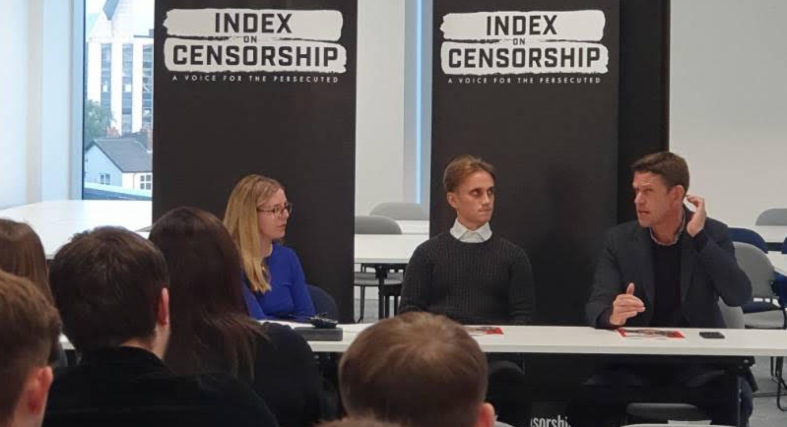“If there is ever an opportunity to try and pretend a country is a nice country, it’s when everyone is diverted by someone kicking a football,” said Ruth Smeeth, CEO of Index on Censorship. Smeeth was introducing a panel discussion entitled “Qatar 2022: When Football and Free Speech Collide”. Hosted in collaboration with Liverpool John Moores University, the event marked the launch of the Autumn 2022 edition of the Index on Censorship magazine, which looks at the role of football in extending or crushing rights ahead of the Qatar World Cup.
Index on Censorship Editor-in-Chief Jemimah Steinfeld was joined by David Randles, the BA Sports Journalism programme leader at Liverpool John Moores University, who has spent much of his career on sports desks and in press boxes. She was also joined by Connor Dunn, a public relations account manager who deals with big names from the football world, including Liverpool footballer Trent Alexander-Arnold, and was formerly a journalist at Reach PLC.
The issue of whether the FIFA World Cup 2022 being held in Qatar will be a force of change for good was prominent. Dunn was unsure whether there would be any long-term change in the country but felt there will in the short term, saying that “Qatar will want to show the world they are the best country on earth. They’ll be lax with those sort of rules people in the West will be used to [the human rights violations], as there will be potential for stories to be blown up”.
Therein lies a danger, as Steinfeld pointed out. Reeling off a series of examples, she said: “All of the editorials said that while France won the 2018 World Cup Putin was the real winner. The world forgot about the invasion about Crimea.” The fear therefore is that Qatar will relax their attacks on human rights during the tournament, court international leaders, put on a great show and as a result people will walk away with a much better impression of the country than they really should.
Despite attempts to appear more moderate, Randles said that he thinks most minorities would not visit the country due to safety issues. He said: “Would you go to support your team in a regime which doesn’t support you? I don’t think so. If you don’t feel safe, why would you go?” He also pointed out the fact that in Qatar’s neighbouring country Saudi Arabia (whose Sovereign Fund bought Newcastle FC last year), women still cannot attend football games.
Naturally discussion came round to the issue of migrant workers, who have died in huge numbers during the building of infrastructure for Qatar. Sadly the exact numbers are hard to come by, a nature of how tightly information is controlled in the country.
Dunn though highlighted one potential positive that has emerged from the heightened awareness of awful working conditions in Qatar. With claims of potential slave labour being used due to Qatar’s punitive ‘Kafala’ system (which has since been reformed on the back of World Cup coverage), there are hopes for reparations in the future. Dunn said: “There are calls to give the same amount of money the World Cup winner will win, which is about 440 million dollars, to make reparations and give that to underpaid migrant workers and families of those who have died. It’s not a big chunk of the predicted profits from the tournament but goes some way to changing things.”
On other positives that could come out of Qatar, all the panel agreed that football still has a unique way to be transformative. Steinfeld cited Permi Jhooti’s story from the new magazine which inspired the film Bend it Like Beckham, an interview with the head of the Afghan Women’s football team and the England Lionesses winning the recent European Championships for the nation’s first major trophy in 56 years.
And of course footballers, with their millions of fans, are often more listened to than politicians and could use their platform when in the country to raise rights issues. While they accepted that footballers shouldn’t be compelled to speak up, the event was full of examples of those who have – like Marcus Rushford and his campaign for free school meals – and in so doing have brought about important and far-reaching societal change.






